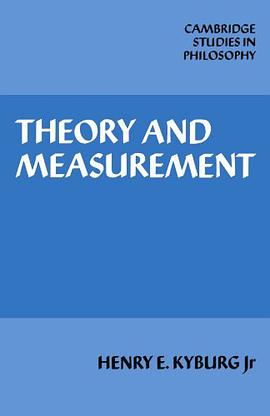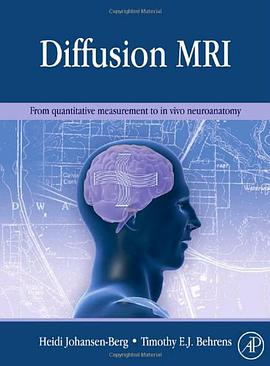

具体描述
Measurement is fundamental to all the sciences, the behavioural and social as well as the physical and in the latter its results provide our paradigms of 'objective fact'. But the basis and justification of measurement is not well understood and is often simply taken for granted. Henry Kyburg Jr proposes here an original, carefully worked out theory of the foundations of measurement, to show how quantities can be defined, why certain mathematical structures are appropriate to them and what meaning attaches to the results generated. Crucial to his approach is the notion of error - it can not be eliminated entirely from its introduction and control, her argues, arises the very possibility of measurement. Professor Kyburg's approach emphasises the empirical process of making measurements. In developing it he discusses vital questions concerning the general connection between a scientific theory and the results which support it (or fail to).
作者简介
目录信息
读后感
评分
评分
评分
评分
用户评价
我对于这本书的喜爱,很大程度上源于其独特的叙事方式。它不像传统的学术著作那样枯燥乏味,而是充满了故事性和人文关怀。作者在介绍复杂的理论时,常常会穿插一些历史轶事或者学者的趣闻,这使得原本严肃的论题变得生动有趣。我特别喜欢其中关于某位历史人物研究方法的探讨,那段描述既充满了传奇色彩,又深刻地揭示了科学探索的艰辛与乐趣。这本书让我体会到,理论并非高高在上,而是与人类的实践和情感紧密相连。它让我看到了科学研究背后的人性光辉,以及智者们在探索真理道路上的执着与创新。我曾一度对某个研究领域感到困惑,但读完这本书的相关章节后,我仿佛茅塞顿开,找到了新的研究方向和思路。这种“灵感触动”是这本书最宝贵的馈赠。
评分这本书的封面设计着实吸引人,简洁而富有力量,深蓝色的背景搭配着银色的字体,一种严谨而深邃的学术气息扑面而来。我拿到它的时候,就有一种想要深入探索的冲动。翻开第一页,首先映入眼帘的是目录,条目清晰,层层递进,似乎预示着一场严谨的学术之旅。我迫不及待地跳到感兴趣的章节,那里的论述逻辑严密,引用扎实,仿佛每一句话都经过了深思熟虑的推敲。作者的笔触细腻而精准,对于复杂概念的阐释也力求通俗易懂,这对于非专业读者来说无疑是一大福音。虽然我还没有完全读完,但已经能感受到这本书所蕴含的深厚知识底蕴。它不仅仅是一本关于理论的著作,更像是一座知识的宝库,等待着我去不断挖掘和学习。我尤其欣赏作者在处理一些前沿性问题时所展现出的审慎态度,既不回避挑战,又保持着科学的客观性。这本书无疑为我打开了一扇新的视野,让我对许多既有认知有了更深刻的理解和反思。
评分我不得不说,这本书的观点非常新颖,甚至可以说具有颠覆性。作者在分析问题时,能够跳出传统的框架,从一个全新的角度出发,提出一系列令人耳目一新的论断。我之前从未从这样的角度思考过某个问题,读完后,我感觉自己的思维模式得到了极大的拓展。书中的一些论证,逻辑严密,证据充分,让我无法反驳。它迫使我去审视那些我一直习以为常的观念,并开始质疑它们是否真的站得住脚。这种“颠覆性”的阅读体验,无疑是令人兴奋的。这本书就像一面镜子,照出了我思维的盲点,也为我指明了新的探索方向。我非常期待继续深入阅读,看看作者还会带来哪些令人惊叹的观点和思考。
评分这本书的语言风格是一种独特的魅力。它既有学术的严谨,又不失文学的韵味。作者的遣词造句非常考究,每一个词语的选用都恰到好处,能够准确地传达出思想的深度和广度。我常常被那些精辟的句子所打动,它们如同点睛之笔,让整个论述更加生动有力。在阅读的过程中,我不仅在学习知识,更是在品味语言的艺术。这本书让我意识到,优秀的学术著作,同样可以具备令人赏心悦目的文学品质。我尤其欣赏作者在阐述一些抽象概念时所使用的比喻,这些比喻形象生动,帮助我轻松地理解那些原本难以捉摸的理论。这本书就像一位博学而风趣的导师,耐心地引导我一步步走向知识的殿堂。
评分这本书给我带来的,是前所未有的思维冲击。它并非一味地灌输知识,而是引导我主动思考,甚至挑战我固有的观念。作者在论证过程中,巧妙地设置了一些引人入胜的案例,这些案例生动形象,极大地激发了我的阅读兴趣。我常常在阅读的过程中,不自觉地停下来,反复咀嚼其中的观点,并将其与自己的经验进行对照。这种互动式的阅读体验,是我之前很少在学术书籍中获得的。不得不说,作者的洞察力十分惊人,他能够精准地捕捉到问题的核心,并用清晰的语言将其剖析得淋漓尽致。书中的一些论述,甚至让我对某些领域产生了重新认识的冲动,仿佛一夜之间,我看到了之前被忽略的细微之处。这种“拨云见日”的感受,是对一本好书最直接的肯定。我还在继续研读,但可以预见,这本书将成为我书架上极具分量的一员,我会反复翻阅,从中汲取养分。
评分 评分 评分 评分 评分相关图书
本站所有内容均为互联网搜索引擎提供的公开搜索信息,本站不存储任何数据与内容,任何内容与数据均与本站无关,如有需要请联系相关搜索引擎包括但不限于百度,google,bing,sogou 等
© 2026 book.wenda123.org All Rights Reserved. 图书目录大全 版权所有




















